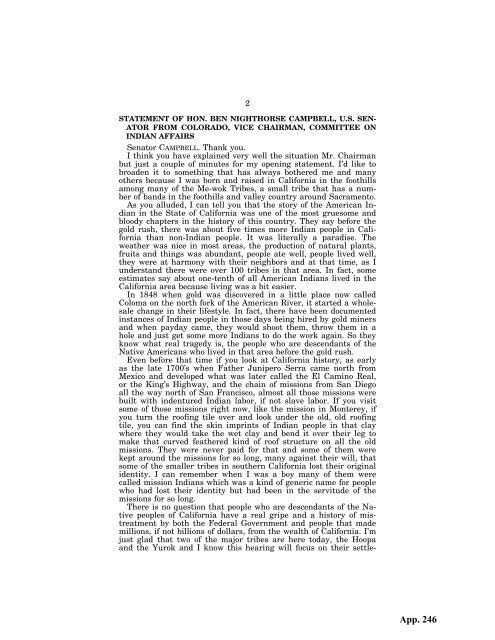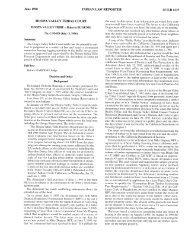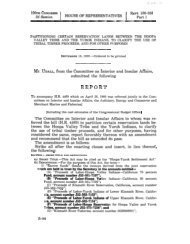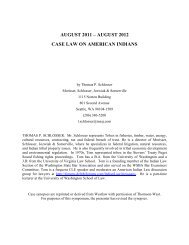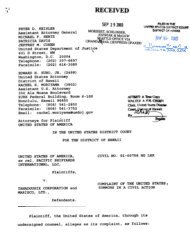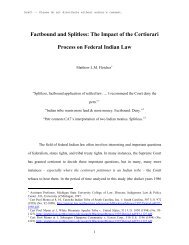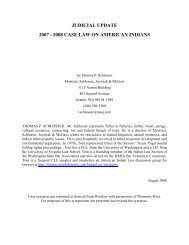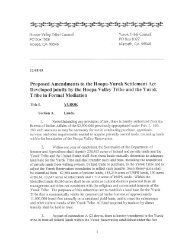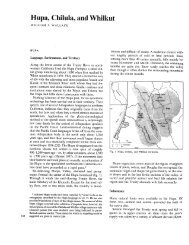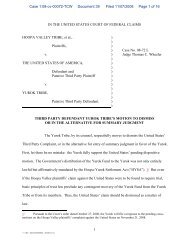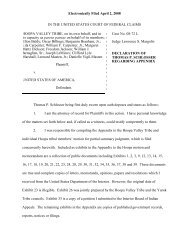Hoopa appendix supporting summary judgment - Schlosser Law Files
Hoopa appendix supporting summary judgment - Schlosser Law Files
Hoopa appendix supporting summary judgment - Schlosser Law Files
Create successful ePaper yourself
Turn your PDF publications into a flip-book with our unique Google optimized e-Paper software.
2<br />
STATEMENT OF HON. BEN NIGHTHORSE CAMPBELL, U.S. SEN-<br />
ATOR FROM COLORADO, VICE CHAIRMAN, COMMITTEE ON<br />
INDIAN AFFAIRS<br />
Senator CAMPBELL. Thank you.<br />
I think you have explained very well the situation Mr. Chairman<br />
but just a couple of minutes for my opening statement. I’d like to<br />
broaden it to something that has always bothered me and many<br />
others because I was born and raised in California in the foothills<br />
among many of the Me-wok Tribes, a small tribe that has a number<br />
of bands in the foothills and valley country around Sacramento.<br />
As you alluded, I can tell you that the story of the American Indian<br />
in the State of California was one of the most gruesome and<br />
bloody chapters in the history of this country. They say before the<br />
gold rush, there was about five times more Indian people in California<br />
than non-Indian people. It was literally a paradise. The<br />
weather was nice in most areas, the production of natural plants,<br />
fruits and things was abundant, people ate well, people lived well,<br />
they were at harmony with their neighbors and at that time, as I<br />
understand there were over 100 tribes in that area. In fact, some<br />
estimates say about one-tenth of all American Indians lived in the<br />
California area because living was a bit easier.<br />
In 1848 when gold was discovered in a little place now called<br />
Coloma on the north fork of the American River, it started a wholesale<br />
change in their lifestyle. In fact, there have been documented<br />
instances of Indian people in those days being hired by gold miners<br />
and when payday came, they would shoot them, throw them in a<br />
hole and just get some more Indians to do the work again. So they<br />
know what real tragedy is, the people who are descendants of the<br />
Native Americans who lived in that area before the gold rush.<br />
Even before that time if you look at California history, as early<br />
as the late 1700’s when Father Junipero Serra came north from<br />
Mexico and developed what was later called the El Camino Real,<br />
or the King’s Highway, and the chain of missions from San Diego<br />
all the way north of San Francisco, almost all those missions were<br />
built with indentured Indian labor, if not slave labor. If you visit<br />
some of those missions right now, like the mission in Monterey, if<br />
you turn the roofing tile over and look under the old, old roofing<br />
tile, you can find the skin imprints of Indian people in that clay<br />
where they would take the wet clay and bend it over their leg to<br />
make that curved feathered kind of roof structure on all the old<br />
missions. They were never paid for that and some of them were<br />
kept around the missions for so long, many against their will, that<br />
some of the smaller tribes in southern California lost their original<br />
identity. I can remember when I was a boy many of them were<br />
called mission Indians which was a kind of generic name for people<br />
who had lost their identity but had been in the servitude of the<br />
missions for so long.<br />
There is no question that people who are descendants of the Native<br />
peoples of California have a real gripe and a history of mistreatment<br />
by both the Federal Government and people that made<br />
millions, if not billions of dollars, from the wealth of California. I’m<br />
just glad that two of the major tribes are here today, the <strong>Hoopa</strong><br />
and the Yurok and I know this hearing will focus on their settle-


